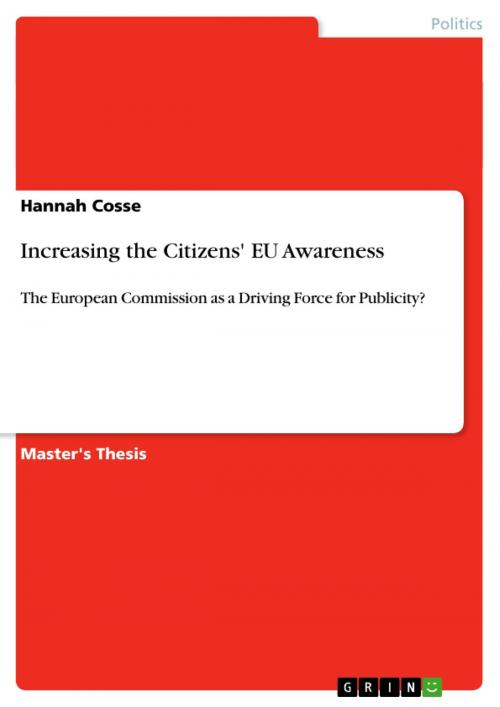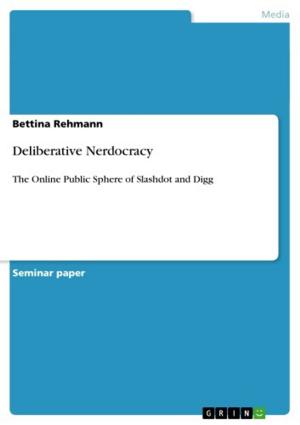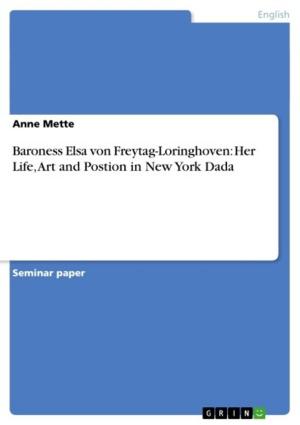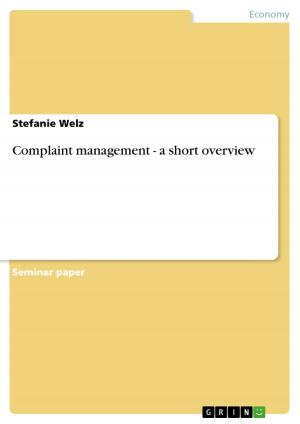Increasing the Citizens' EU Awareness
The European Commission as a Driving Force for Publicity?
Nonfiction, Social & Cultural Studies, Political Science| Author: | Hannah Cosse | ISBN: | 9783640228010 |
| Publisher: | GRIN Publishing | Publication: | December 11, 2008 |
| Imprint: | GRIN Publishing | Language: | English |
| Author: | Hannah Cosse |
| ISBN: | 9783640228010 |
| Publisher: | GRIN Publishing |
| Publication: | December 11, 2008 |
| Imprint: | GRIN Publishing |
| Language: | English |
Master's Thesis from the year 2007 in the subject Politics - International Politics - Topic: European Union, grade: 2,0, University of Münster, 73 entries in the bibliography, language: English, abstract: In the year of the 50th anniversary of the Treaties of Rome, and the 15th year after the (legal) creation of the European Union by the Treaty of Maastricht, European Integration slowed down considerably due to certain hindrances such as the rejection of the Constitutional Treaty, a low turnout at the last election to the European Parliament, and also the necessary revision of the main 'future project', the Lisbon Agenda. However, over the last 15 years we have witnessed a successful process of integration. Notwithstanding this successful story of economic integration and peace and security - one of the most important, but today often neglected attainments of the EU - the process of constant integration seems to have been too fast for the citizens of the European Union: although being legally 'Europeans' since 1992, the demos of the Union does not seem to feel connected to its newly gained political entity. Thus, the Union suffers from considerable democracy, legitimacy and ac-countability deficits. One reason - and characteristic at the same time - is the low participation and involvement of the Europeans in the political system of the Union. This assumption is the real starting point of this work. People need to participate to a greater extent in order to gain a more democratic political system in the EU and thus lay the basis for further integration, which is needed to cope with the arising challenges of the 21st century. But people can only participate in a system they know and knowledge about the EU is quite low. And there is no media attention and therefore a lack of European Publicity. This work analyses what kind of influence the European Commission can have on this sphere of problems, either by its media policy, or by its communication strategy.
Master's Thesis from the year 2007 in the subject Politics - International Politics - Topic: European Union, grade: 2,0, University of Münster, 73 entries in the bibliography, language: English, abstract: In the year of the 50th anniversary of the Treaties of Rome, and the 15th year after the (legal) creation of the European Union by the Treaty of Maastricht, European Integration slowed down considerably due to certain hindrances such as the rejection of the Constitutional Treaty, a low turnout at the last election to the European Parliament, and also the necessary revision of the main 'future project', the Lisbon Agenda. However, over the last 15 years we have witnessed a successful process of integration. Notwithstanding this successful story of economic integration and peace and security - one of the most important, but today often neglected attainments of the EU - the process of constant integration seems to have been too fast for the citizens of the European Union: although being legally 'Europeans' since 1992, the demos of the Union does not seem to feel connected to its newly gained political entity. Thus, the Union suffers from considerable democracy, legitimacy and ac-countability deficits. One reason - and characteristic at the same time - is the low participation and involvement of the Europeans in the political system of the Union. This assumption is the real starting point of this work. People need to participate to a greater extent in order to gain a more democratic political system in the EU and thus lay the basis for further integration, which is needed to cope with the arising challenges of the 21st century. But people can only participate in a system they know and knowledge about the EU is quite low. And there is no media attention and therefore a lack of European Publicity. This work analyses what kind of influence the European Commission can have on this sphere of problems, either by its media policy, or by its communication strategy.















